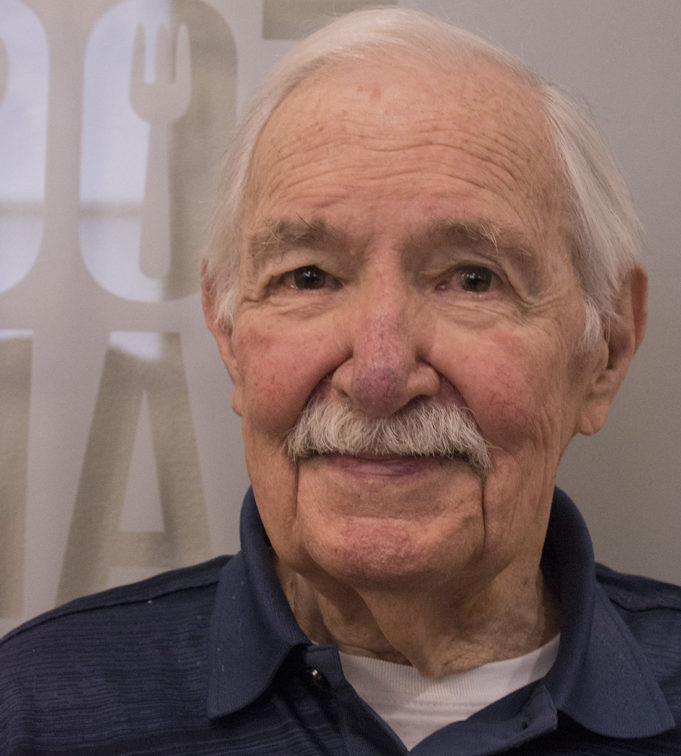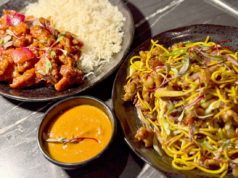Walter Kaufmann Hospitality School at the Tarrant Area Food Bank (2525 Cullen St, FW, 817-891-9472). Class session No. 3: 8:15am-12:30pm Aug 19-Sept 13, followed by an optional two-week unpaid internship.
On a sunny June morning in a spare demo-kitchen of the Tarrant Area Food Bank, 10 women gathered around two meticulously set tables decked out in a jet-black tablecloth, cloud-white napkins, sturdy cutlery, delicate flower centerpieces, and a battery of water and wine glasses.
These women were attending the second-ever set of classes to convene under the banner of the Walter Kaufmann Hospitality School. This program takes its name and inspiration from the 90-year-old founding father of Fort Worth’s fine dining scene, thanks largely to his 30-year run at his restaurant, Old Swiss House – one of the city’s first upscale establishments.
“I started this because I noticed that here there was no school for waiters or front-of-house personnel,” Kaufmann said. “Chefs are formally trained, and in Europe waiters do apprenticeships, so I believe American service workers should be trained as well. They should take an equal amount of credit for the success of a restaurant.”
Ranging in age from 18 to their 40s, every student enrolled in the Kaufmann school looks to absorb the myriad unseen ways to offer the most thoughtful yet subtle service in an upscale restaurant.
On this morning, Roberta Villaverde was the class expert in the taken-for-granted art of fine-dining hospitality.
Villaverde’s qualifications include starting one of Dallas’ most sought-after staffing agencies for restaurants and private events (Zodiac Hospitality Services and Event Staffing) and working for renowned Dallas chef Stephan Pyles as a star server.
During this Wednesday session, Villaverde spent 60 minutes concentrating on the minutia of properly serving water, soda, tea, coffee, or any other beverages as the opening interactive moment between server and guest. Villaverde sprinkled easy-to-recall mottos (“Set yourself up for success” and “details make all the difference”) as she choreographed how to be an effective fine-dining server.
“I will always stand where I can see everyone in my section,” Villaverde instructed. “I’m always maintaining eye contact.”
“Right” was a key cardinal direction in Villaverde’s first instructions to the class –– as in removing from the right, serving from the left.
“Good afternoon, would you like a beverage?” Villaverde offered as an acceptable server greeting. “We have a great house iced tea with lemon, peach, and vanilla –– it’s delicious.”
Villaverde slipped into subtle salesmanship mode, something Kaufmann completely endorses.
“Waiters aren’t just serving food,” Kaufmann insisted. “They can and should be very effective salesmen.”
Villaverde’s ultimate bit of class advice was delivered with a soft yet assured voice: “Always give your service with a smile,” she said.
Sally Bolick Strong has been central to the genesis of the Walter Kaufmann Hospitality School. Her background includes 20 years in human resources management before 1986, when she opened her own restaurant, Café Matthew, in Hurst. Until it closed in 1995, the eatery was one of the very first New American-Southwestern fine-dining locales in Tarrant County.
Strong, who also boasts 20 years as owner of Bravo Catering and Event Planning, developed the hospitality and fine-dining service program along with food bank director Charles Boswell.
Eventually, the Walter Kaufmann Hospitality School was born with the inaugural four weeks of class (plus two additional weeks of unpaid internships), which kicked off this past January with eight students attending.
“What many of the students seek is, as corny as it sounds, to nurture and make people happy,” Strong said.
The Kaufmann course purposely steers clear of food preparation. It is all about learning service skills, which seemingly without effort is on consistent display at upscale, fine-dining restaurants, private clubs, and large catered events.
“We’ll take two hours to do nothing else but beverage service,” Strong said, “and then there will be service skills around lunch and dinner, along with a couple of days of banquet service.”
Another of the vital elements of the Kaufmann program is the six off-site visits to such participating restaurants as Waters: Bonnell’s Coastal Cuisine, Reata, Grace, Ellerbe Fine Foods, The Capital Grille, Blue Mesa, Ridglea Country Club, and The Fort Worth Club.
These sessions might touch on everything from the profit and loss of running a restaurant and how to read the restaurant versus private club patron to food and wine education or how to achieve flawless pre-shift preparation.
“The restaurant visits offer a once-in-a-lifetime chance to network and meet with the owners and possibly arrange for a future job interview,” Strong said.
Christina Singletary is a 37-year-old Fort Worth native and the founder of A Taste of the Kingdom Catering. After two days of class, Singletary said she has learned so much about the value of staying silent while serving the customer, allowing the guests to fully enjoy the experience.
“I’ve learned to redefine what hospitality means,” she said. “It’s greatest meaning is to make somebody feel totally at ease. To let your actions make people feel at home, comfortable enough to enjoy their meal.”
Limarie Lappost, an 18-year-old native of Camden, New Jersey, who moved to Fort Worth two years ago and recently graduated from the culinary program at the Hollenstein Career and Technology Center, is also soaking up the collective experience of her instructors.
“I have no doubt this class will greatly expand my knowledge of the hospitality industry,” she said.
Strong couldn’t conceal her joy at the Kaufmann school’s first-ever donation –– a check for $2,000 from Les Dames d’Escoffier-Dallas, the international philanthropic organization of professional women involved in the fields of fine food, beverage, and hospitality.
“This just reaffirms what the Kaufmann school’s overall goal is: to educate those people already involved with, or not yet in, the industry who just want to make people happy through offering great service to go with the great food,” she said.
Toward the end of class, a gregarious Kaufmann eagerly recalled a time when a long-standing patron of Old Swiss House wanted to bring in a party of eight and specifically wanted “Morris” to wait on them.
“When I told her that Morris had the day off, this customer took all of a second before making up her mind: She would wait until her favorite server was back at the restaurant before coming in,” he recalled. “That’s when I finally fully got it: People return to your place as much for the service as for the chef.”
For more information on future classes, email hospitality@tafb.org or visit tafb.org.












